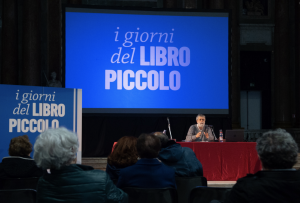CULTURE Small Books, a Key to Understand the Future
Contrary to what some might believe, the future of books is not in danger. Books have undergone a metamorphosis, adapting themselves to a faster society, but reading is still a widespread practice, explains historian David Bidussa.
“Reading and writing have changed what an essay book is, even before the fiction. Unlike the fiction often turned into saga (Harry Potter, above all) the essay book cannot afford to be as long as in the past. It is a product that must be consumed quickly, read quickly, and must communicate a problem. The essay book is now an opportunity to discuss, rather than the tool that offers a solution. It represents the opportunity to make ‘a round table’ of ideas, proposals, projects”.
This opportunity was translated in a Festival – I giorni del Libro Piccolo (The Days of the Small Book) – curated by Bidussa – contributor of Pagine Ebraiche -, which took place at the Genova’s Palazzo Ducale last weekend.
The exhibition put together essays, authors, major issues of the present and discussions with the public.
Some of the key words of the event were walls, border, identity, Europe, development, right/left, past/future, civil religion, nation, and cities today.
Various authors proposed analyses and readings of the phenomena that the key words synthetically summarized and that were part of their books.
It was a successful way for the authors and the public for discuss together some of the main themes of the modern time.
“Small books are not cookbooks, but tools for traveling and thinking. – explained Bidussa – So, books and words, which generate books, which spread words and which again ask for other books to come into play”. At the event in Genova those who write but also those who read and listen could contriute to the debate with the aim of digging into reality, understanding it – beyond slogans and rhetoric -, to make proposals and question them, to develop a critical capacity and analysis of a world that moves quickly and in which the book – small in this case – is a fundamental tool to not remain behind.

